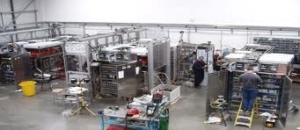When operating in the workshop of an industrial organization, several different kinds of labor are performed, which mostly involve the use of industrial components that include parts, metals, materials, chemical solutions, oils, gas, and many other products. Most often, an industrial organization will need to clean the workshop in order to rid the area of potential contaminants that could harm or negatively affect the next operation, the workers laboring in the workshop, or even the environment. This is why industrial parts cleaners are important to industrial businesses, as they rely on a strong and efficient cleaning mechanism or component to ensure the complete cleansing of a location. One of the reliable types of cleaning is called industrial aqueous parts cleaning. This blog is dedicated to explaining how this industrial parts cleaning option functions.
When the cleaning needs to be done on site, many industrial businesses will employ the use of an aqueous industrial parts cleaner. Aqueous and semi-aqueous agents incorporate the emulsion of solvents and water – a cleaning solution – that effectively cleans a 
Aqueous industrial parts cleaners have advantages pertaining to particle and polar contaminants, and the cleaning solution only requires higher inputs of mechanical and thermal energy to be effective. Whereas, certain other solvents more easily remove oils and greases, but have health and environmental risks. In addition, most other industrial parts cleaning solvents are flammable, and consequently lead to a higher chance of fire and explosive hazards. Today, with the proper industrial parts washer equipment, it is generally accepted that aqueous industrial parts cleaners remove oil and grease as easily as solvents.















